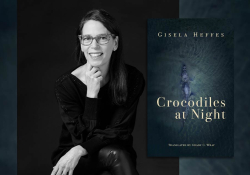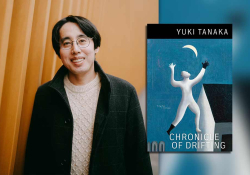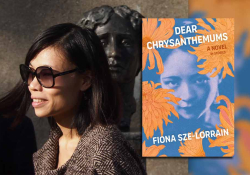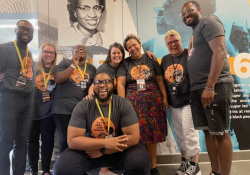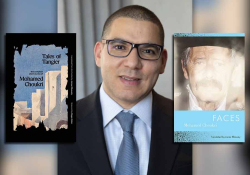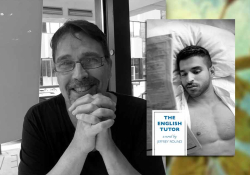Those Who Create Desire an Audience: A Conversation with Darlington Chibueze Anuonye
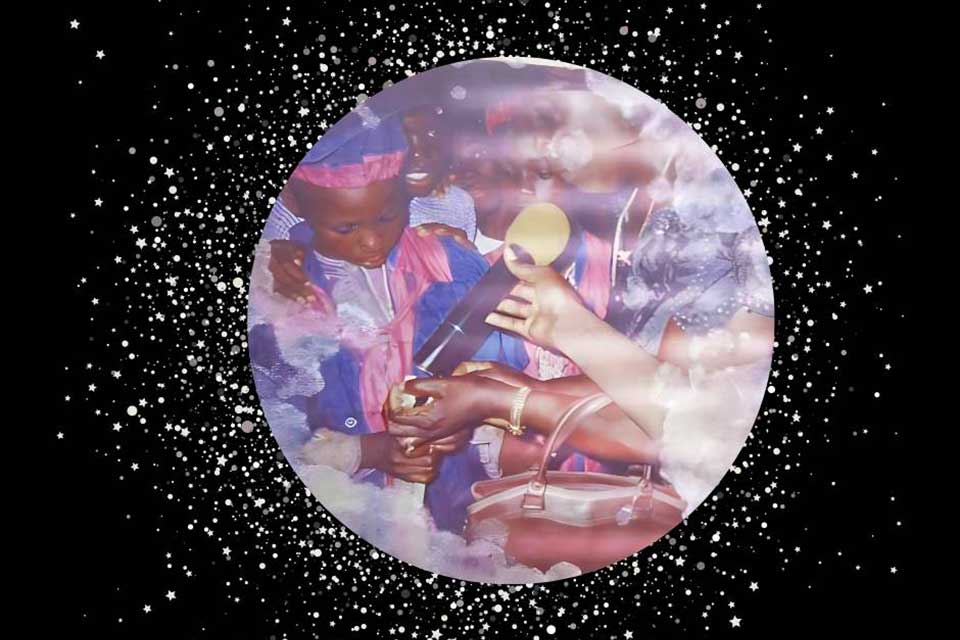
Darlington Chibueze Anuonye, a writer and the nonfiction editor of Ngiga Review, is known by many writers and readers of African literature as a literary conversationalist. A doctoral student at the University of Nebraska–Lincoln, Anuonye serves as a research assistant at the African Poetry Book Fund. He is the curator of Selfies and Signatures: An Afro Anthology of Short Stories, co-editor (with Ezechi Onyerionwu) of Daybreak: An Anthology of Nigerian Short Fiction, and editor of the international anthologies of writings Through the Eye of a Needle: Art in the Time of Coronavirus and The Good Teacher: A Collection of Essays in Honour of Isidore Diala and Samuel Anthony Itodo. His current project, Unbound, an anthology of contemporary Nigerian poetry, which he is co-editing with Nduka Otiono, is forthcoming in March. Anuonye’s conversations, reviews, and essays have appeared in World Literature Today, Hopkins Review, Brittle Paper, New Black Magazine, Eunoia Review, and elsewhere.
In this interview, Anuonye reflects on exercising intellectual freedom, drawing on his personal experiences and the life of his beloved fictional character. He also discusses the pain of losing his mother and her influence on his life and career. His thoughts on the need to engage writers on their works through conversations and critiques are as coherent as the work he does in that regard.
Anthony Chibueze Ukwuoma: Hello, Darlington. Thank you for the opportunity to engage in this conversation with you. It is true that we have conversations every time we meet, and the subjects of our talks often tilt toward art, oral and written literature, the potency of stories, the weaponization of narratives, and history. But we have not made any conscious attempt to record our dialogues in any form until now. Although I can tell that you do not approach our private conversations with the carefulness and precision of a commenter afraid to be extravagant with words or cautious of spewing controversy, I wonder now if you have any suppressed opinions? In this generation of ultraliberalism, it seems that cancel culture has become the norm, and I wonder if there are certain opinions—literary, sociocultural, or political—that you’re conscious of hiding from finding expression in conversations such as this. What does intellectual freedom mean to you?
Darlington Chibueze Anuonye: Anthony, you’re right, in the years that we’ve known each other we’ve talked about so many things that it is almost impossible to remember everything. You’re asking whether there are things I said to you in private that I can’t say in public. Of course there are. For instance, you know that I tie wrapper at home; that I think Abdulrazak Gurnah’s characters are among the most broken people on earth; that I don’t like anything as much as I like cooking and watching someone eat my food. But I can’t say these in public, can I? Not to forget, you also know I have consumed so much cucumber that I dream of being chased by the fruit in my sleep.
Two weeks ago an American teenager who engaged me in a conversation on my way back from school said he had read Chinua Achebe’s Things Fall Apart the night before we met and would like to learn more about the people Achebe wrote about. I told him I’d be delighted to chat with him. Just as we were parting, he said he had been following the aftermath of the Nigerian election and asked for an update on the issues surrounding the certification of our president. I was shocked that he knew, that he asked me. Well, I told him what I know. I know he will tell someone else. So, for me, intellectual freedom isn’t just the liberty to speak the truth—significant as that is—but also the preparedness to spread that truth, even at the risk of self-ridicule.
Intellectual freedom isn’t just the liberty to speak the truth—significant as that is—but also the preparedness to spread that truth, even at the risk of self-ridicule.
Anthony: A passive character, Egbuchunam, whom the narrator mentioned in your short story “Love Is an Animal Thing,” comes to mind. In the story, Egbuchunam was “slaughtered because he was an intellectual, wasted because he believed in liberating his soul through learning.” Is that how costly intellectual freedom can be?
Darlington: I didn’t even know anyone would notice Egbuchunam, so thank you for mentioning him. Egbuchunam was murdered by his people during a war because they considered him too educated, too removed from their reality, and so potentially capable of sabotaging their struggle for freedom. But what did Egbuchunam do to warrant the suspicion and hate of his people? He spoke about the universal need for human freedom when his people lamented their own need. He knew something he thought the others did not know, or at least could not fully understand, which was that the war was wrongly waged, that poor people like him and his brothers were victims of the capitalist ambition of local politicians and colonial empires. His people didn’t see his point because it was the enemy soldiers—not the politicians nor their former colonizer—that shot at them, raped them, and ravaged their cities and homes. You see, it’s a matter of ideological dissonance, and it could happen to anybody, any people, any nation, in times of war.
Egbuchunam is someone I wish to meet in real life. I want to listen to him talk about what he knows about the world and about the war that destroyed his world. But I suppose he would begin from what really happened before that war, how and why that war was fought, who the actual beneficiaries of the war are. You know, capitalism and colonialism structured the world in ways that complicate the truth and make intellectual freedom a bewildering oxymoron. Look at Patrice Lumumba of Congo! Did you see how Belgium destroyed his government with violence and rumors of war? Well, they needed someone who would allow their neocolonial stronghold on Congo after several decades of unimaginably cruel colonial exploitation. Now, think of Nigeria and what it might have become had Britain not insisted on remaining in charge after independence. I suppose Egbuchunam would have loved Fanon with an abiding admiration.
But there’s also another inspiration for the character. My closest friend in secondary school bore the name Egbuchunam. He was a soft-spoken person. Did he ever speak? You could count on him not to be provoked in the face of intolerable abuse, and that angered me a lot. We often joked that if he was ever arrested by the police his charge would read like this: “. . . and he was silent.” So, in creating the fictional Egbuchunam, I was trying to reimagine my friend as someone who spoke out more frequently. Now that I think about it, Egbuchunam literally means: “Do not kill me prematurely.” You see, it is a plea for life, for the oppressed to live. The price of speaking out is weighty. Intellectual freedom can be demanding, just as it can be liberating.
Intellectual freedom can be demanding, just as it can be liberating.
Anthony: In your conversation with Chisom Okafor, you observed the similarity of preoccupation between your work and Chelsea Beiker’s. This shared inspiration, you suggested, lies in “her attempt to resurrect her father through her work.” Reading “A Continuum of Loss,” one can feel both your love for your late mother and your grief for her loss. At the end of that essay, you declared, “I will not let you eat sand, mother. That is why I am here, kneeling before this silent tomb, looking beyond its cracks, emboldened by years.” This declaration, I think, bears the meaning you’ve assigned to your life’s journey, for in saying “that is why I am here,” you acknowledge that the purpose of your vocation lies in preserving your mother’s memory.
I wonder now if your mother loved literature, if literature was ever the thing that held you two, and now the means through which you remember her. But then I think about the concluding remark of the essay, and I feel that when you wrote “I don’t know what Talitha Cumi means, but if it raised the dead girl, I know it will raise you,” you were not just referencing the Bible. By “Talitha Cumi,” I think you mean attempts by writers such as Beiker to sublimate the pain of loss with the wonders of artistic expression. Writing grief is not new. Following the death of her parents, Chimamanda Ngozi Adichie wrote Notes on Grief; following his experience and grief over the loss of his comrades at war in Vietnam, Tim O’Brien produced The Things They Carried. In your experience, is creative writing a potent medicine for living with grief?
Darlington: I don’t think anything erases the grief of the passing of a beloved one. If I knew any potent medication, I would have taken it. But writing helps me. Writing “A Continuum of Loss” was one of the hardest things I’ve done. And I’m glad I did it, after several years of thinking about the weight of my loss, how it rested so heavily on my shoulders and in my chest.
My mother bought books for me and encouraged me to read. But we didn’t read together. The closest we came to sharing an intellectual bond was when she said she’d train me in America. Well, I’m in America now doing my doctoral studies. So, I’m still living my mother’s dream, which is also my dream. The relationship I had with my mother was beyond an encounter with books; it’s the encounter itself, something you retrieve from life and put in literature so that others will read and know and testify that it’s possible to simultaneously be a son and a lover. I loved my mother so much I learnt how to braid so I could plait her hair. I think that my mother and I were lovers in our past lives.
Yesterday I listened to Patty Obasi. In “A Continuum of Loss,” I talked about how Obasi’s songs saved my mother. Yesterday he saved my memory of her. I don’t know how I survived this long without Beatrice. That’s my mother’s name, and she brought me peace. I know she’s making sure I survive and thrive now that she’s physically absent. When my mother died, one of our neighbors said, “What will Chibueze do?” A stranger listening to her might think I was my mother’s only child. No, I have five other siblings. The woman was only acknowledging what she knew about my relationship with my mother. I want to see my mother’s face in my last moment. I want to go the way I came into the world, in my mother’s arms and care.
I’m not alone in my grief. After “A Continuum of Loss” was published, a number of people reached out to me and said they read the story and couldn’t stop thinking about how much we’ve lost as human beings and yet how much we’ve gained from life. Loss continues. Isn’t that the point of life? You know, the publication of the story coincided with the EndSARS protest. I had to write to the editors of Eunoia Review to extend the publication date to a later time, because I wanted to honor the courage of those young fighters who died telling Nigeria the truth it wanted to hide. I was sad when I realized that the story had been published before the editors read my mail.
It’s almost seventeen years since my mother transitioned, and each day, I know she watches over me.
Anthony: I don’t imagine it to be easy—losing a beloved mother, especially at a young age. But I know that watching over you fills her with pride. And I don’t just mean your achievements, Darlington. What amazes me is how you manage to go about your work and personal life with the sensibilities of a mother; drawing colleagues to yourself, engaging them in conversations on their works and helping young writers grow; going to the market to buy fish and vegetables, making soup and serving those around you. I hope you find comfort in this thought that your mother is not only watching you but also within you.
Darlington: Thank you, Anthony. Your kind words comfort me.
Anthony: I’m glad. In recent times, you’ve published more works as an editor, conversationalist, and literary critic than as a creative writer. Why is it important to engage writers and critics of African literature in literary conversations?
Darlington: One of the greatest gifts people can give you is their attention. I’m saying this because those who create desire an audience. When you write, you want to be read. Engaging with the text and the author is what drives my work as an editor, an interviewer, and a critic. We need to assist writers to reach the finest depth of their talent; that’s what I do as an editor. We need to pay attention to what writers produce; that’s what I do as a critic. We need to encourage writers to talk about what they are doing and what they hope to do; that’s what I do as a conversationalist. I would like to think I’m fulfilling a cultural obligation.
One of the greatest gifts people can give you is their attention.
My mother was fond of saying that humans have not found a cure for death because we rarely have conversations that illuminate the unknown and confront the unknowable. I think this philosophy inspired my interest in conversations. So, each time I have an opportunity to interact with someone or a group of people, I consider myself performing the liberating ritual of finding the cure for death. You see, everything returns to my mother!
Anthony: We seem to carry our mothers’ thoughts with us. I try to take my work seriously because my mother thinks highly of me. I would hate to disappoint her, you see. Anyway, I would have loved to meet your mother. I agree with her on the power of conversations. The cure for death would be invaluable, but I believe many wars have occurred that would have been avoided if parties listened and understood each other.
Darlington: You’re right, Anthony. In the absence of true dialogue and understanding, war becomes death. It never ends.
Anthony: One of your ongoing projects is an anthology of Nigerian poetry, which you started working on as an editor in 2018. The collection, titled Unbound, was part of the focus of your lecture at the University of Nigeria in December 2022 on “The Emergence of a New Generation of Nigerian Poets.” You made the following remark at the event: “I have waited a long time for Unbound to exist. You have, too, even though you may not know this yet. In this collection, philosophies clash, stifled voices find release, and humanity decries its timeworn misrepresentation. The poets are inadvertently protesting, people who have been culturally, socially, or politically written-off are telling their own stories, saying: ‘We are here. Our norms and values are valid.’ Telling the human story properly, in its totality, is at the core of the creative visions of these poets. The stories they share in their poems emphasize how similar we are, in spite of our differences. Even when they highlight our small differences, they do so in a manner that upholds our shared humanity.”
However, in a recent essay in which Ernest Ògúnyẹmí questions the Nigerianness of Nigerian poetry, he claims that, “‘Nigerian poetry’ does not yet exist. Many of today’s Nigerian poets are working within a tradition that is not ours, a tradition that is mainly American. Even if our poetry happens to be Nigerian in its character, if it possesses a distinct manner of speech, a movement of language all our own, the horizon of Nigerian poetry (of Nigerian literature) is greatly limited; to speak of ‘Nigerian poetry’ would mean that there is already a wide variety of poetry ‘types’ within ‘our tradition.’” Ògúnyẹmí’s opinion is obviously in contradiction with your thoughts on Nigerian poets and their poetry. Would you say that the poems in Unbound are not Nigerian?
Darlington: Unbound is a Nigerian anthology of poems. By this I mean that it features the poems of Nigerian writers, both those living in the country and outside of it. I also mean that it is the work of people whose lived experiences are inspired by Nigeria’s reality. A poet like Trust Tonji—who is Beninese but who has lived almost all his life in Nigeria—is included in the anthology. The anthology speaks of and to the varied personal and social experiences of the contributing authors in ways that centralize their Nigerian identity. Unbound will be published in Canada and in Nigeria next year. So, I look forward to sharing it with readers, whom I believe are capable of deciding for themselves what the anthology is.
I read Ògúnyẹmí’s article. Every generation needs its own critics. I mean the role of the critic is almost existentially important. I think Ògúnyẹmí’s article would have benefited from a better understanding of the workings of globalization and by a close reading of the poems and the social milieu from which they emerged.
Every generation needs its own critics.
Anthony: In 2021 Abdulrazak Gurnah won the Nobel Prize in Literature. Following his literary breakthrough, you decided to read his novel Paradise. I remember because you recommended the book to me at the time. But unlike some critics of African literature who argued that Gurnah was obscure and therefore undeserving of the recognition, you went on to read more of Gurnah’s work. You didn’t stop until you read all ten of his novels. What is it about Gurnah’s writing that inspired you to base your thesis on his works?
Darlington: Gurnah’s work has endured in me. His novels consistently engage with colonialism and migration in ways that are powerfully humane. In Memory of Departure and in Paradise, Hassan and Yussuf experience parental abuse within the background of colonial violence. While colonialism breaks Hamza in Afterlives and forces him into exile, Daud in Pilgrims Way and Rashid in Desertion suffer loneliness and shame in exile. In all these works, Gurnah merges memory, imagination, and language to illuminate and interrogate history.
Gurnah merges memory, imagination, and language to illuminate and interrogate history.
Beyond their focus on colonialism and migration, these novels equally demonstrate a thematic complexity that marks Gurnah out as a writer of genius. From Memory of Departure to Afterlives, Gurnah writes about nonhuman characters with the same dedication in which he follows the lives of his human characters. So, both human and nonhuman beings are depicted with nuance as victims of colonial violence and migration in the novels. So much can be said about Gurnah’s gift. I’m glad that the English Department of Kyambogo University, the Ugandan Women Writers’ Association, and the Pan African Writers’ Association are jointly hosting an international conference on Gurnah’s work in November. Let us meet there and share in the wonder of literature.
Anthony: Thank you for the invitation. As you know, I’m a big fan of Gurnah. The novels of his I’ve read made me weep. It’s what literature should do to us sometimes, I guess. Thank you for making time for this conversation. I wish you all the best on your future projects.


